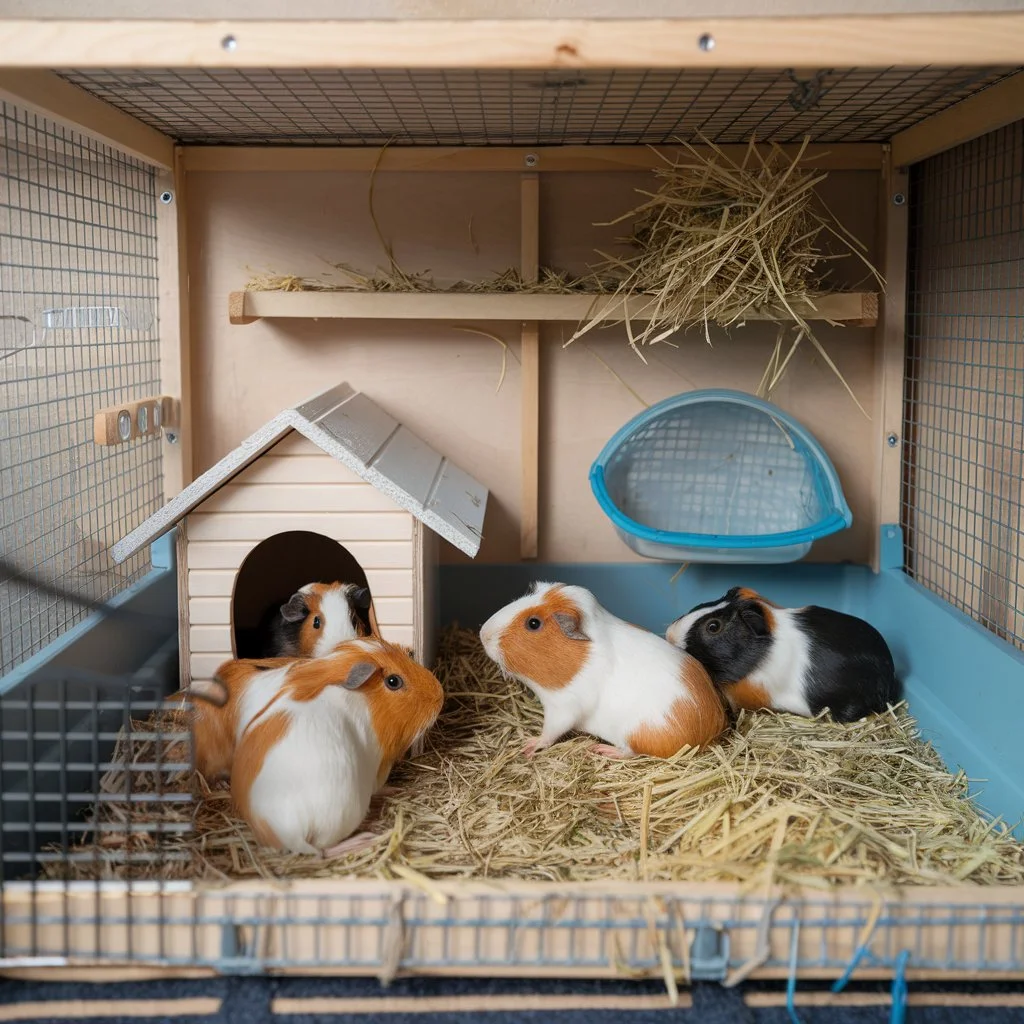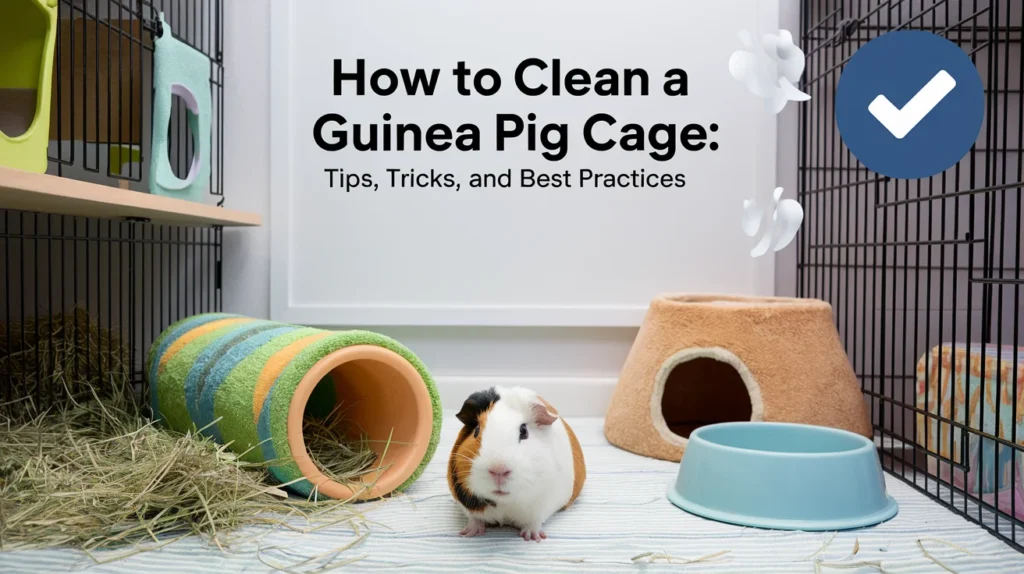Owning a guinea pig means becoming a pet parent who is committed to their well-being. A significant part of that responsibility is ensuring they live in a clean, safe, and comfortable environment. Regular cage cleaning not only improves the health of your guinea pigs but also helps eliminate odors, prevents the spread of bacteria, and enhances their overall quality of life. In this detailed guide, we’ll take you through everything you need to know about how to clean a guinea pig cage efficiently, from daily spot cleaning to thorough weekly deep cleans, plus some helpful cleaning hacks!
Why a Clean Cage is Crucial for Your Guinea Pig’s Health
Before we dive into cleaning routines, it’s important to understand why a clean cage is essential for your guinea pig. Guinea pigs are small, delicate creatures that require a clean, safe environment to thrive. Here’s why regular cleaning matters:
- Health Protection: Guinea pigs are susceptible to respiratory issues, skin infections, and parasites, all of which can arise from dirty bedding, waste buildup, and stagnant water.
- Odor Control: A dirty cage quickly turns into a smelly environment. Daily and weekly cleaning prevents unpleasant odors and helps maintain a fresh-smelling home for both you and your pet.
- Stress Reduction: Guinea pigs are sensitive to their surroundings. A clean cage promotes comfort and reduces stress, leading to happier, more relaxed pets.
Daily Cleaning: How to Spot Clean a Guinea Pig Cage
Daily spot cleaning is essential to prevent the buildup of waste and bacteria in your guinea pig’s cage. A quick daily clean will keep the cage looking fresh and will also help your guinea pig stay healthy. Here’s how to do it:
Why Daily Cleaning is Important
- Bacteria Prevention: Spot cleaning helps to remove waste and uneaten food that can lead to bacteria growth.
- Odor Control: By removing droppings and waste, you prevent the strong odor that can accumulate if left unchecked.
- Stress-Free Environment: Daily cleaning provides a cleaner, more hygienic space for your guinea pig, minimizing discomfort.
Step-by-Step Guide to Spot Cleaning
- Remove Droppings and Uneaten Food
- Change Soiled Bedding
- Focus on the areas where your guinea pig spends most of its time. If bedding becomes wet or overly soiled, replace it with fresh bedding.
- Always check under food bowls and water bottles, as these areas tend to get wet more quickly.
- Wipe Down Surfaces
- Use a mild, pet-safe disinfectant to wipe down surfaces like water bottles, food bowls, and other frequently touched items. Avoid harsh chemicals, as they can harm your guinea pig.
- For natural cleaning, you can use a vinegar and water solution to sanitize the cage without exposing your guinea pig to toxic substances.
- Check the Water Bottle
- Ensure that your guinea pig’s water bottle is clean and filled with fresh water. Check for any clogs or leaks, and clean the nozzle regularly to prevent mold growth.
Weekly Cleaning: How to Deep Clean a Guinea Pig’s Cage
While spot cleaning is important for maintaining hygiene, a weekly deep cleaning is necessary to give the cage a thorough refresh. This process tackles areas that may not be cleaned daily, removing stubborn dirt, bacteria, and buildup.
Why Deep Cleaning is Essential
- Complete Hygiene: A deep clean removes hidden waste, dirt, and debris that daily cleaning might miss.
- Better Health: Deep cleaning helps reduce the risk of skin infections, respiratory issues, and parasites.
- A Fresh Start: Resetting your guinea pig’s environment each week promotes their happiness and comfort.
Step-by-Step Guide to Deep Cleaning
- Step 1: Remove Your Guinea Pigs
- Before starting the deep clean, safely remove your guinea pigs from the cage and place them in a secure, temporary area with food and water.
- Step 2: Remove Accessories and Old Bedding
- Take out everything from the cage, including food bowls, water bottles, hideouts, toys, and any other accessories. Also, remove all old bedding, which may be soiled with waste.
- Step 3: Clean and Disinfect the Cage
- Use a non-toxic, pet-safe cleaner to wash the cage’s floors, walls, and bars. Pay special attention to corners where waste may accumulate.
- For stubborn dirt, scrub with a soft brush or sponge. You can also use a diluted vinegar-water solution to disinfect.
- Step 4: Dry the Cage
- Once the cage is clean, allow it to dry completely before adding new bedding. Air drying is best, but you can speed up the process with a clean towel to wipe down the surfaces.
- Step 5: Add Clean Bedding & Accessories
- Add fresh bedding to the cage. Use absorbent, dust-free bedding like aspen shavings, fleece, or paper-based bedding. Avoid cedar or pine shavings, as they can cause respiratory problems.
- Reassemble the cage by placing clean accessories back, ensuring everything is safe and easy for your guinea pig to access.
- Step 6: Return Guinea Pigs to the Cage
- Once the cage is dry and clean, return your guinea pigs to their home. Observe them for a few minutes to ensure they’re comfortable in their freshly cleaned environment.
Hacks to Make Cage Cleaning Easier

Cleaning a guinea pig cage doesn’t have to be a labor-intensive task. Here are some clever hacks to make the process easier:
Use Washable Fleece Liners
- Instead of disposable bedding, consider using washable fleece liners. These can be easily washed and reused, saving you money in the long run.
- Fleece liners are comfortable for guinea pigs and provide a soft, absorbent surface.
Invest in a Litter Box for Guinea Pigs
- Train your guinea pigs to use a litter box. Place it in the corner of their cage where they tend to urinate, making cleaning easier and more efficient.
Use a Small Handheld Vacuum
- A handheld vacuum can quickly remove hay, bedding, and droppings from the cage without disturbing the entire setup. It’s perfect for spot cleaning and small debris removal.
Create a Cleaning Schedule
- Set up a cleaning schedule to ensure you stay on top of cage maintenance. Mark daily spot cleaning and weekly deep cleaning tasks in your calendar or planner to stay organized.
Use Stackable, Easy-to-Clean Accessories
- Opt for easy-to-remove, stackable accessories like bowls and water bottles. This makes it simpler to clean and disinfect them regularly.
The Importance of a Clean Guinea Pig Cage
Maintaining a clean guinea pig cage goes beyond just appearance. It impacts their health, comfort, and overall quality of life. Here’s why:
Health Benefits for Your Guinea Pigs
- Respiratory Health: Guinea pigs are prone to respiratory issues, especially if their cage is filled with dust or mold. Clean bedding and sanitized surfaces help prevent these problems.
- Skin Infections & Parasites: A dirty cage can harbor parasites like mites and bacteria that cause skin infections. Regular cleaning eliminates these risks.
- Happy Guinea Pigs: A clean, comfortable environment reduces stress, promotes activity, and contributes to your guinea pig’s happiness.
Odor Control
- Keeping the cage clean minimizes odors caused by waste, so your home smells fresher and more inviting.
Stress-Free Environment
- Guinea pigs are sensitive to their surroundings. A clean, tidy cage helps them feel secure and relaxed, reducing anxiety.
Conclusion
A clean guinea pig cage is vital for both their health and your home’s comfort. By following the daily spot cleaning routine and performing a thorough weekly deep clean, you’ll ensure your guinea pig has a safe, healthy, and stress-free environment. Don’t forget to incorporate the handy hacks to make cleaning easier, and remember—cleaning is as much about consistency as it is about thoroughness.
Keeping a clean cage will not only benefit your guinea pig but also strengthen your bond with them as you provide the best care possible. Regular cleaning creates a positive, fresh environment that supports their health and happiness!
People Also Ask and FAQs
- How often should I clean my guinea pig’s cage?
- Spot clean daily, and perform a deep cleaning once a week to ensure the cage remains hygienic and fresh.
- Can I use regular cleaning products for my guinea pig’s cage?
- No. Always use pet-safe disinfectants. Harsh chemicals like bleach can harm your guinea pig.
- How can I control the odor in my guinea pig’s cage?
- Regular cleaning, using absorbent bedding, and ensuring good airflow can help keep odors under control.
- What is the best bedding for guinea pigs?
- Paper-based bedding, fleece, and aspen shavings are the best options. Avoid cedar and pine shavings due to their harmful oils.
- Do guinea pigs need to be removed when cleaning?
- Yes, always remove your guinea pigs during cleaning to ensure their safety and avoid stress.

